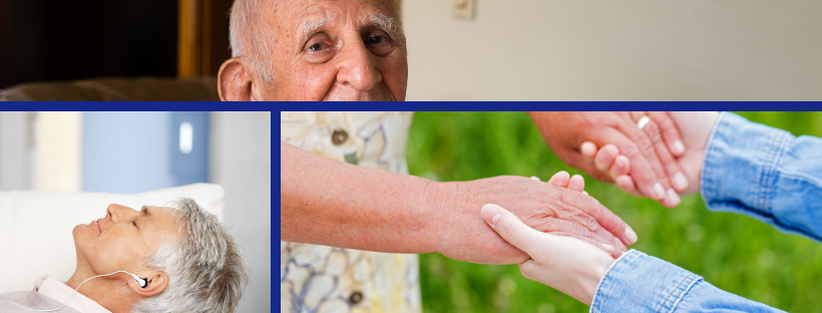Why Music Matters
“WHY MUSIC MATTERS” BY WENDY STAPLEY, MTBC
As part of the coursework for a degree in music therapy, you learn about the challenges of different populations and how music can address those challenges. There are specific challenges that those in assisted living homes often deal with.
With this population you often see:
Sometimes in our Audrey’s Angels sessions we sing for residents with very little response. They are non-verbal and immobile. In these cases we might be tempted to think, “What’s the point? They aren’t getting anything out of this.” This is far from the truth. Music is effective even for those with very little response. A study by Taylor in 1997 showed that a conscience state does not have to be present for the brain to respond to auditory input. A great deal of response to music is subcortical and available to clients who have upper cortex damage such as that seen with Alzheimer’s. In Connie Tomaino’s 1998 study entitled “ Clinical Application of Music in Neurological Rehabilitation” she states, “But the response to music, it would seem, is wide spread and probably not only cortical, but subcortical so that even in diffuse cortical disease like Alzheimer’s, music can still be perceived, enjoyed and responded to.” If I have a person who is not responsive, I try to hold their hand and sing to them at some point in the session. I often can get eye contact and it is then that I know they have been reached in some way.
What Audrey’s Angels does is more that just a pleasant hour of entertainment. It helps improve social interaction, it improves quality of life, it promotes more movement, improves emotional health. It helps organize a disorganized brain so that they can perform everyday functions that most take for granted. Most importantly it helps them reconnect with their story. Like the woman who when I sang Santa Lucia was able to tell me that her mothers name was Lucia and her father was Italian and used to sing that song to her mother. Or my friend the concert pianist, who has evident short-term memory loss, yet can play Chopin and Debussy flawlessly and with beautiful expression. The first time I heard him play I couldn’t help but feel that I had experienced something very special. What a treat it was for me to hear him play, I was the one who had been served that day.
Why does music matter? Music helps them reconnect them to their joy. There is a song called “Today” that I love. The chorus says “A million tomorrows will all pass away, ere I forget all the joy that was mine today.” That’s what we do, we help them remember their joy.
As part of the coursework for a degree in music therapy, you learn about the challenges of different populations and how music can address those challenges. There are specific challenges that those in assisted living homes often deal with.
With this population you often see:
- Cognitive and sensory issues. Many experience a decline in visual acuity, hearing, balance, and the tactile, taste and sense of smell. Alzheimer’s can lead to cognitive decline, confusion and a decrease in environmental awareness. Music can help improve reality orientation because it involves attending to, responding to and recognizing sensory input. Music is a sensory activity. Participants respond with recognition. Songs of the seasons and holidays stimulate discussion. It can help maintain cognitive skills because music increases neural activity through sensory stimulation and increases attention span with its attention grabbing elements.
- Physical changes including diseases such as arthritis lead to decreased muscle strength and stamina, which can lead to loss of mobility. Music helps with this because it can motivate movement. There is a phenomenon called the thalamic response, which is an instinctive physical response to music. It’s the toe tapping or head bobbing that we see when people are listening to rhythmic music. Using hand percussive instruments can improve hand eye coordination and singing can increase breath capacity and support speech. Music can also distract from pain with the release of natural painkillers such as endorphins, which encourages movement. Many times in my sessions, residents have got up to dance, sometimes with the caregivers. I have often seen those with little response move their foot in rhythm to the music. In one of my sessions this week a 95 year old woman got up and started dancing the Charleston as I was playing Battle Hymn of the Republic. She had a lot of great moves. As she sat down she said, “That’s for all my fellow inmates!”
- Another challenge is decreased socialization and self-image due to loss of life role, prestige and autonomy. Music can help because it is a social activity; a reason to be together and a structural means for establishing interpersonal relationships. It encourages conversation and social interaction. These music sessions can be just plain fun and many times the residents will express this. On one occasion, as I was packing up to leave after my session, one woman expressed; “That was fun! I don’t even know where I am, but I still sang.”
- Grief and depression affect many due to loss of loved ones, independence and support networks. Those with more advanced dementia can become combative. Familiar music can help decrease agitation. Rhythmic music gives them something to entrain to and focus on. For mental health, music supports self-image through participation in a creative activity. Participants are able to have some autonomy in music activities. Music reduces stress. Participants participate in life review, which is an important activity for older adults to help them resolve issues and express feelings. Use of spiritual music like gospel songs and hymns can support hope and spiritual beliefs.
- Quality of life is improved with music by improving the general atmosphere. Often caregiver moods are improved as well. I have had caregivers sing to their residents during my sessions. Other family members can interact musically with their loved one, which fosters positive interaction. It is a special session when one of the family members is present. Many times they are touched to tears to see how the music affects their loved one and themselves.
- Many of the residents have memory issues from advanced Alzheimer’s and other types of dementia. Alzheimer’s is a build up of protein in the brain that creates neurofibrillary tangles in the neurons and senile plaque on the neurons. It affects the upper cortex first and gradually the whole brain. One of the most perplexing symptoms of Alzheimer’s is memory loss. Music can help with this because it can trigger vivid memories. I’m sure most of you have had the experience of hearing a song from your youth and suddenly you remember scenes from your life in vivid detail. This happens because music affects the limbic system of the brain and particularly the amygdala, which is the emotional center of the brain. The amygdala is responsible for laying down memory. It is activated by higher frequencies and by rhythmic pulse needed to set a memory trace. Music helps us encode, store and retrieve memory. The auditory nerve creates general neural arousal needed for memory storage. Music may also stimulate hormone production such as dopamine needed for storing emotion. Since memory relies on a temporal sequence of events, music fosters memory since it is a temporal sequence of events.
Sometimes in our Audrey’s Angels sessions we sing for residents with very little response. They are non-verbal and immobile. In these cases we might be tempted to think, “What’s the point? They aren’t getting anything out of this.” This is far from the truth. Music is effective even for those with very little response. A study by Taylor in 1997 showed that a conscience state does not have to be present for the brain to respond to auditory input. A great deal of response to music is subcortical and available to clients who have upper cortex damage such as that seen with Alzheimer’s. In Connie Tomaino’s 1998 study entitled “ Clinical Application of Music in Neurological Rehabilitation” she states, “But the response to music, it would seem, is wide spread and probably not only cortical, but subcortical so that even in diffuse cortical disease like Alzheimer’s, music can still be perceived, enjoyed and responded to.” If I have a person who is not responsive, I try to hold their hand and sing to them at some point in the session. I often can get eye contact and it is then that I know they have been reached in some way.
What Audrey’s Angels does is more that just a pleasant hour of entertainment. It helps improve social interaction, it improves quality of life, it promotes more movement, improves emotional health. It helps organize a disorganized brain so that they can perform everyday functions that most take for granted. Most importantly it helps them reconnect with their story. Like the woman who when I sang Santa Lucia was able to tell me that her mothers name was Lucia and her father was Italian and used to sing that song to her mother. Or my friend the concert pianist, who has evident short-term memory loss, yet can play Chopin and Debussy flawlessly and with beautiful expression. The first time I heard him play I couldn’t help but feel that I had experienced something very special. What a treat it was for me to hear him play, I was the one who had been served that day.
Why does music matter? Music helps them reconnect them to their joy. There is a song called “Today” that I love. The chorus says “A million tomorrows will all pass away, ere I forget all the joy that was mine today.” That’s what we do, we help them remember their joy.


